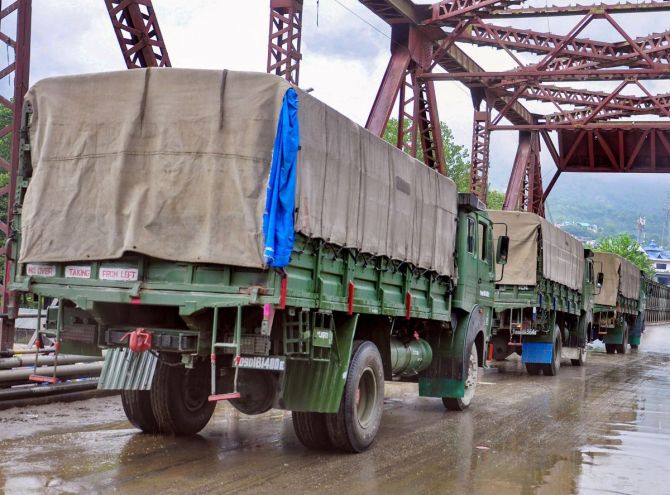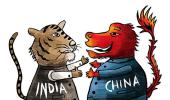India on Friday said it expects China to "sincerely" work with it towards the objective of achieving "complete disengagement" and de-escalation along the Line of Actual Control and linked future of bilateral ties to the state of their border.

External Affairs Ministry spokesperson Anurag Srivastava said "full restoration" of peace and tranquility in the border areas as agreed to by the two sides is essential in the context of overall development of the bilateral relationship.
"As the external affairs minister (S Jaishankar) had noted in a recent interview 'the state of the border and the future of our ties, cannot be separated'," Srivastava said at an online media briefing.
India and China held several rounds of diplomatic and military talks in the last few weeks for disengagement of troops in the eastern Ladakh region.
However, the process has not moved forward as expected by India.
"While we would like the ongoing disengagement process to be completed at the earliest, it is important to bear in mind that achieving this requires agreed actions by both sides," Srivastava said.
"We therefore expect that the Chinese side to sincerely work with us towards the objective of complete disengagement and de-escalation and full restoration of peace and tranquility in the border areas as agreed by the Special Representatives," he added.
Srivastava was referring to decisions taken by National Security Advisor Ajit Doval and Chinese Foreign Minister Wang Yi on complete disengagement of troops along the LAC during their telephonic talks on July 5.
Doval and Wang are Special Representatives for boundary talks.
The formal process of disengagement of troops began on July 6, a day after the Doval-Wang talks.
The MEA spokesperson said both sides have agreement on broad principles of disengagement and based on it, some progress had been earlier made.
"I must add that translating these principles on ground is a complex process that requires re-deployment of troops by each side towards their regular posts on their respective sides of the LAC," Srivastava said.
"It is natural that this can be done only through mutually agreed reciprocal actions. While we would like the ongoing disengagement process to be completed at the earliest, it is important to bear in mind that achieving this requires agreed actions by both sides," he added.
The Chinese People's Liberation Army has pulled back from Galwan Valley and certain other friction points but the withdrawal of its troops has not moved forward from the Finger areas in Pangong Tso, Gogra and Depsang as demanded by India, according to military sources.
India has been insisting that China must withdraw its forces from areas between Finger Four and Eight.
The mountain spurs in the area are referred to as Fingers.
Referring to military and diplomatic talks, Srivastava said further meetings are likely to take place in the near future.
"India and China remain engaged through both diplomatic and military channels to ensure complete disengagement along the India-China border areas," he said.
Srivastava said the talks have been in accordance with the agreement between the special representatives that early and complete disengagement of the troops along the LAC and de-escalation from India-China border areas in accordance with bilateral agreement and protocols and full restoration of peace and tranquility was essential for the "smooth" overall development of ties.
He said several meetings under the framework of Working Mechanism for Consultation and Coordination on border affairs and between senior commanders of the two sides have taken place wherein both sides discussed the implementation of the disengagement process and further steps to ensure it is completed at the earliest.









